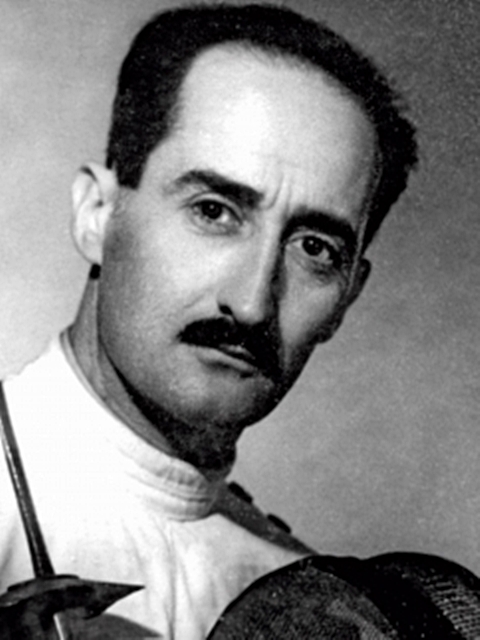
| Roles | Competed in Olympic Games • Non-starter • Referee |
|---|---|
| Sex | Male |
| Full name | Béla•Bay |
| Used name | Béla•Bay |
| Born | 8 February 1907 in Seini, Maramureș (ROU) |
| Died | 26 July 1999 (aged 92 years 5 months 18 days) in Budapest, Budapest (HUN) |
| Affiliations | BEAC, Budapest (HUN) / Budapesti Haladás, Budapest (HUN) |
| NOC |  Hungary Hungary |
Béla Bay started his sports career in high school in the colors of Szatmár SE, then in 1927 moved to Budapest, where he competed at BEAC and, from 1948, at Bp. Haladás. He was a universal fencer, competing in all three weapons. He won individual Hungarian championships in foil in 1936 and 1947, and in épée in 1935 and 1937. In the latter he also won team championship titles in 1941 and 1944. In sabre his best results were from 1935, when he finished third in the Hungarian Championship, ahead of several Olympic champions in this discipline.
From 1933 to 1948 Bay was a member of the Hungarian national team in all three weapons. In 1935, he finished third at the European Championship in team épée. He won silver medals in all three team competitions at the 1933 World University Championships. At the 1936 Berlin Olympics, he finished seventh with the foil team and ninth in the individual épée. Twelve years later at the London Olympics, he finished fifth in both team competitions. He finished his active career in 1952.
Bay graduated as a lawyer in 1937, but never worked in that profession, spending all his time in fencing. During his active career, from 1938 he became a board member and then vice-president of the Hungarian Fencing Association. He participated at the 1948 Summer Olympics as an athlete but was also the leader of the Hungarian fencing team. In 1949, Béla Bay became the specialist supervisor of fencing, and from 1951 became the coach and federal captain of the national team. He held this post until 1961 and then from 1968 to 1976.
Bay was also head coach of the fencing department of the BVSC, and became an honorary associate professor at the College of Physical Education and then an honorary college teacher. His name is associated with the development of the Hungarian épée style, the essence of which is that, instead of the Italian one, he combined the French style with the elements of the Hungarian sabre. One of his outstanding merits is that in September 1961 he started the master’s program in fencing at the College of Physical Education as an independent specialty. In addition to fencing, Bay was also involved in hunting, and from 1947-49 was the vice-president of the Association of Hungarian Hunters.
| Games | Discipline (Sport) / Event | NOC / Team | Pos | Medal | As | |
|---|---|---|---|---|---|---|
| 1936 Summer Olympics | Fencing |  HUN HUN |
Béla Bay | |||
| Foil, Individual, Men (Olympic) | 5 p2 r4/5 | |||||
| Foil, Team, Men (Olympic) | Hungary | =7 | ||||
| Épée, Individual, Men (Olympic) | 9 | |||||
| Épée, Team, Men (Olympic) | Hungary | 3 p6 r1/4 | ||||
| 1948 Summer Olympics | Fencing |  HUN HUN |
Béla Bay | |||
| Foil, Individual, Men (Olympic) | ||||||
| Foil, Team, Men (Olympic) | Hungary | =5 | ||||
| Épée, Team, Men (Olympic) | Hungary | =5 | ||||
| 1952 Summer Olympics | Fencing |  HUN HUN |
Béla Bay | |||
| Épée, Team, Men (Olympic) | Hungary |
| Games | Sport (Discipline) / Event | NOC / Team | Phase | Unit | Role | As | |
|---|---|---|---|---|---|---|---|
| 1936 Summer Olympics | Fencing |  HUN HUN |
Béla Bay | ||||
| Foil, Individual, Men (Olympic) | Pool #4 | Judge | |||||
| Sabre, Team, Men (Olympic) | Match #1 | Poland — Sweden | Judge | ||||
| Sabre, Team, Men (Olympic) | Match #1 | Italy — Canada | Jury President | ||||
| Sabre, Team, Men (Olympic) | Match #4 | Turkey — Yugoslavia | Judge | ||||
| 1948 Summer Olympics | Fencing |  HUN HUN |
Béla Bay | ||||
| Sabre, Team, Men (Olympic) | Match #4 | Italy — United States | Jury President | ||||
| Sabre, Team, Men (Olympic) | Match #2 | Argentina — Czechoslovakia | Jury President |